This summer, Grace Farms Foundation’s CEO and Founder, Sharon Prince, traveled with the Foundation’s Special Projects Liaison & Tea Expert, Frank Kwei, and Grace Farms Foods Co-Founder Adam Thatcher, to India to visit the Fairtrade and organic tea suppliers that provide teas for the Foundation’s public benefit subsidiary, Grace Farms Foods. The purpose of the trip was to conduct first hand observation of the tea process from plant to cup, including the adherence to ethical and sustainable standards, and to foster relationships with suppliers.
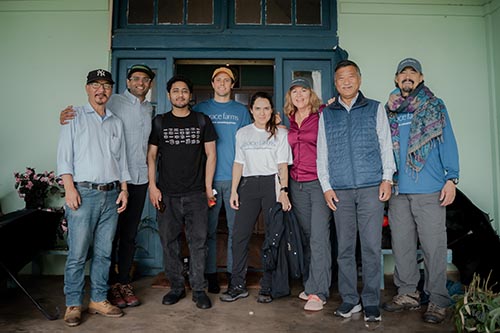
From left to right: O.P. Lama (Selimbong Tea Garden Manager), Kunall Patel (Davidson’s Organics), Abbas Baig (photographer), Adam Thatcher (Grace Farms), Saida Abdala (Grace Farms), Sharon Prince (Grace Farms), J.P. Gurung (Tea Promoters India), and Frank Kwei (Grace Farms). Photo credit: Siddhartha Joshi
Darjeeling is a region of northeastern India adjacent to Nepal, Tibet, and Bhutan at the foothills of the Himalayas, and the terroir makes for the ideal tea-growing conditions for the best teas in the world. In fact, the tea is so acclaimed from this region it is called the ‘champagne of teas’ and teas from any other part of the world cannot label themselves as ‘Darjeeling’. The mountainous setting is beautiful yet still quite remote, in very rugged terrain hours away from the nearest airport.
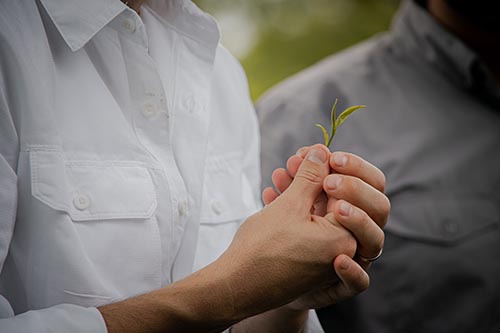
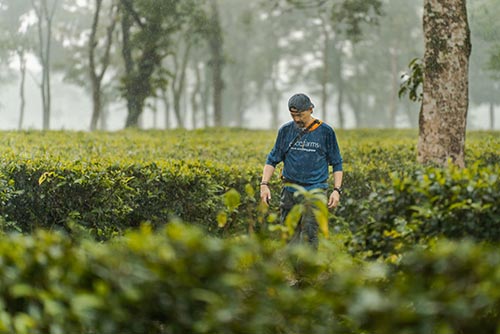
The Foundation’s Special Projects Liaison & Tea Expert, Frank Kwei. Photo credit above: Saida Abdala and below photo credit: Abbas Baig.
“There is no substitute for experiencing something in-person. The first time you set foot at Grace Farms, you feel a sense of connection to the architecture, landscape, mission, and community. Our first visit to Darjeeling was similar; we participated in a beautiful relationship between nature and people that were working together to cultivate not only some of the finest tea in the world, but also a more just and sustainable future.” – Adam Thatcher, Co-Founder, Grace Farms Foods
A Q&A with Adam Thatcher, CEO Grace Farms Foods:
Tell us about the history of tea sourcing, how does ethical sourcing differ from non-ethical sourcing? Is the tea industry ahead or behind the curve when it comes to sustainable practices and ethical sourcing?
Adam: Tea grows around the world, but predominantly in India, China, Japan, Taiwan, and Africa. Tea, as with many food and material commodities, is either grown by small-holder farms or through a larger corporate plantation system. While Africa is the largest grower of tea, India has been setting the groundwork for ethical sourcing dating back to the 1800s.
In India today, all the tea gardens are owned by the state and the land is leased to Indian management companies who oversee the care of the land and its production. This system is therefore reliant on ethical management companies to care for their employees (tea pickers, farmers, factory workers) by guaranteeing them fair living wages, good working conditions, and ensuring the communities where the workers live have access to education, healthcare, and sanitation services.
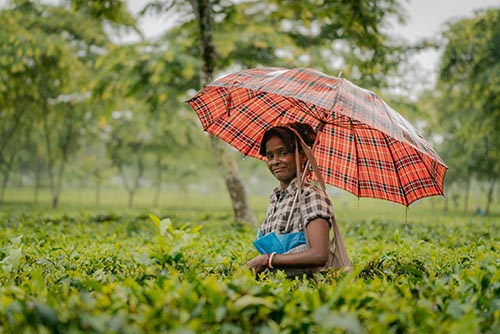
Photo credit: Abbas Baig
Tea that is not ethically sourced, in comparison, can originate in gardens that do not pay their workers fair wages or that restrict their ability to leave and work elsewhere. Systems can be in place to trap the workers, who largely lack access to education, in forms of debt bondage.
How did you identify the tea gardens with which you work?
Adam: Grace Farms Foods has decided to partner with Fairtrade America and Fair Labor Organization Certification (FLOCERT) to source from organic farms that meet their rigorous standards to ensure ethical and sustainable farming practices are implemented and audited.
Grace Farms Foods has also partnered with a third-generation tea management company called Tea Promoters India (TPI), which is one of the few companies in India committed to organic and Fairtrade practices in their tea gardens throughout the Assam, Darjeeling, and Dohas Valley regions of eastern India.

Photo credit: Abbas Baig
Grace Farms Foods expressed from the very beginning the criteria we had for our teas: to be both environmentally sustainable (organic and biodynamic) and ethically sourced from a human rights perspective (Fairtrade certified). This expectation of transparency and quality from the beginning ensured alignment for all our sourcing, which made the world of choices relatively small.
Some exciting news from this trip is that Grace Farms Foods hand selected two new Darjeeling teas from the gardens they visited. These teas will be introduced in late fall 2022.
What advice would you give other businesses seeking to source ethically?
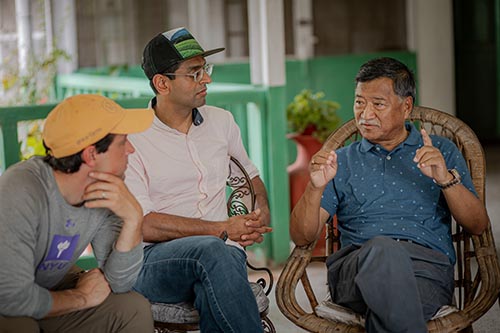
From left to right: Adam Thatcher (Grace Farms), Kunall Patel (Davidson’s Organics), and J.P. Gurung (Tea Promoters India). Photo credit: Abbas Baig
If traceability is not possible and no third-party certification has audited the supply chain, then there could be a reason for concern.
Sourcing ingredients that have both traceability and third-party certification is a great start, but then taking time to conduct your own first-party audits of the suppliers is the next step. This involves visiting the gardens, speaking with the owners, managers, and workers, and taking time to understand the problems they face and what efforts they are making to better serve their workers and the communities that support their business. Creating opportunities to talk with the managers and workers and asking questions about the working conditions is an important way to build a relationship of trust and decrease the chance that forced labor is occurring especially at the beginning of the supply chain.
Walking the tea gardens to learn how the plants and soil are cared for will not only expand your appreciation for the quality of the product, but it may also provide an indication of how a garden management team cares for its people. On this trip we learned a tremendous amount about not only the benefits of organic and biodynamic farming but also the challenges. For example, organic farms require significantly more maintenance against invasive plant and insects; however, the result is a higher quality product that actually returns nutrients to the soil rather than depleting, which in turn allows for sustainability of the environment as well as for the humans who live and work within it.
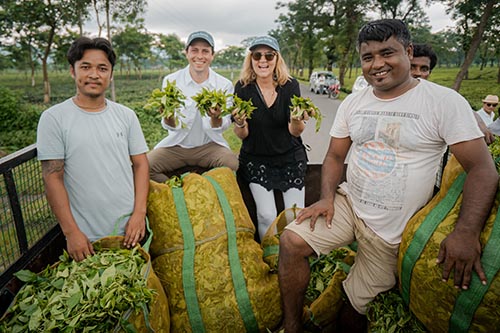
Adam Thatcher, second from left and Sharon Prince, visiting suppliers. Photo credit: Siddhartha Joshi
What do you see as the biggest obstacle when it comes to ethical sourcing for companies?
Adam: The biggest obstacle that comes with ethical sourcing is the cost of ingredients. Food and materials that are made with forced labor or poor working conditions are inherently less expensive to produce compared to ethically produced products. Categories like tea and coffee are highly competitive and the cost is a major factor in a customer’s decision. Our consumer mindset has us programmed to ask for ‘more for less’. We’ve tried to take the approach of charging a fair price that is an accurate depiction of the cost of quality ingredients and manufacturing that are both sustainable and ethical, and we hope this can be a model towards market transformation. In addition to supporting a fair wage for workers, with every pound of tea that is purchased, funds are reinvested into the communities where the tea is sourced, in the form of community projects that are decided by an association from the community. We are demonstrating the values of the Grace Farms Foundation through this decision-making process.
How can consumers make more sustainable and ethical purchasing decisions?
Feature photo credit: Abbas Baig


























